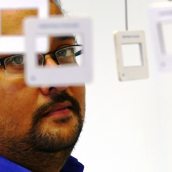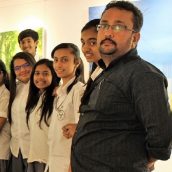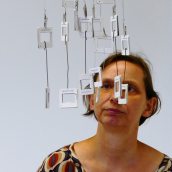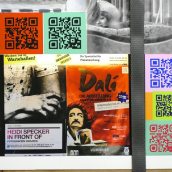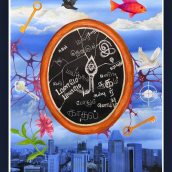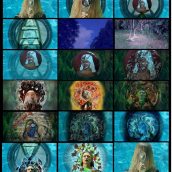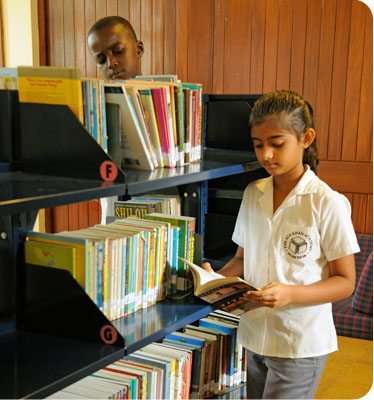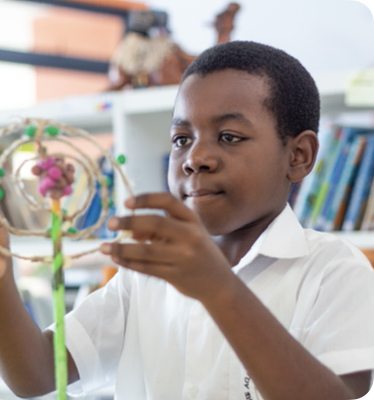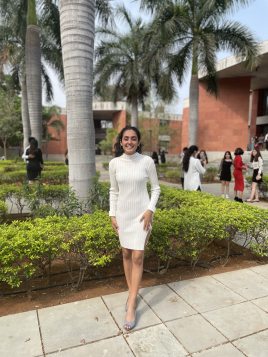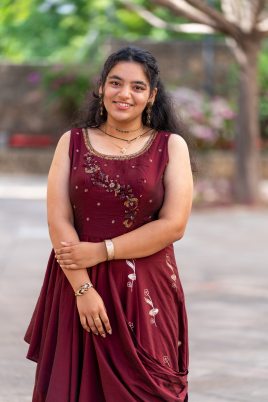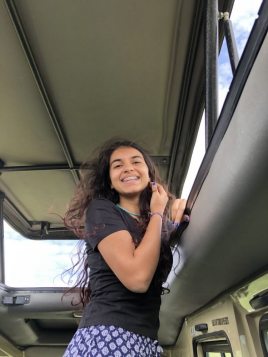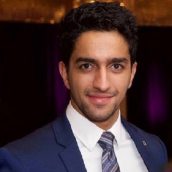Visual Arts Educator Models Lifelong Learning
Vijayaraghavan Srinivasan is a prolific painter and video artist whose work explores the intersection between self and society. He facilitates IB Visual Arts at the Academy, in his words, “aimed at developing a strong formalistic and aesthetic understanding as a basis for unique personal expressions in my students. I believe the post-modernist approach to teaching Visual Arts enables students to rediscover the intelligence towards relationships by creating links with multiple disciplines and capitalise on imaginative novelty.”
Over the last decade, he has participated widely in various biennales, video festivals, and art residency programs across India and the world. This allows him to gain insights into contemporary art styles and enhance his pedagogical strategies in teaching art appreciation to promote creativity, critical thinking and encourage artistic independence along with a spirit of inquiry.
“For seven years,” Vijay tells us, “I have had the wonderful opportunity to instruct a diverse group of primary, middle and senior school students. I encourage and expect my students to be confrontational towards themselves as well as towards what they are seeing, to always question – never settle, and to be aware of the wonder that can be revealed by the creation of a work through honesty, passion and empathy.”
In 2016, Vijay’s piece The Trinity Saga was published by Aesthetica Magazine in the UK. The Aesthetica Artists Directory is a global network of artists engaging with the professional art world through forums for discussions and interactivity both in the print and digital spheres, where the best in emerging art from around the world has a chance to be discovered.
Proving that he embodies the philosophy of lifelong learning, in the summer of 2016 Vijay attended an advanced-level visual arts course at the Berlin Art Institute Studio Program, which is closely tied to the IB Diploma Programme art curriculum. The course work offered advanced-level studio art practice and experimentation with mixed media. “The avant-garde art practices and experiments with unconventional processes further enhanced my understanding of contemporary art practice,” says Vijay, “and focused on producing artwork in a transdisciplinary way, with compassion and responsibility as key themes.”
After the course, Vijay had the opportunity to work on a collaborative project with Kelly Reedy, an American experimental artist who specialises in art therapy. Labelled Under the Ageis, the mixed media video installation explored the archaic myth of Medusa in relationship to the primal aspects and duality of the ‘great mother’ and ‘terrible mother’ archetypes. Reedy’s research into psychological theories concerning the quality of the attachment of the primary care giver or “mother” in relation to the development of her child’s security and sense of self, accentuate her exploration of the transformative powers of the creative process in art to heal and make whole again.
“I encourage my students to develop a strong formalistic and aesthetic understanding of art as a basis for expressing their own personal vision,” says Vijay. “I encourage each of them to grow on their own, to be free to make mistakes, to push themselves in ways that their work takes them. I feel that self-directed education is inevitably the best way to guide young people in their education as students of art.”
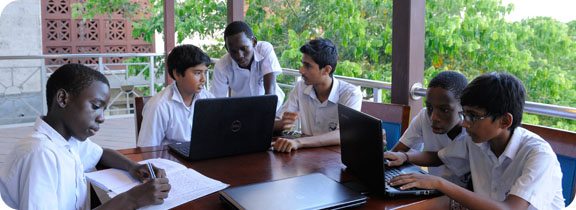
Academic Programme
The Aga Khan Academy Mombasa offers an education of an internationally recognised standard of excellence to prepare students to become intellectually curious, global-minded citizens of the world.
The Academy programme develops students who are committed to positive change and are able to understand and analyse complex issues of local, national and global significance.
Our curriculum is built on the framework of the International Baccalaureate (IB). The IB is a thorough, multidisciplinary curriculum that fosters:
- Intellectual curiosity
- Creativity
- Leadership development
- Social consciousness
- A pluralistic sensibility
The IB is also known for preparing students for admission to the best universities in their own countries and abroad.
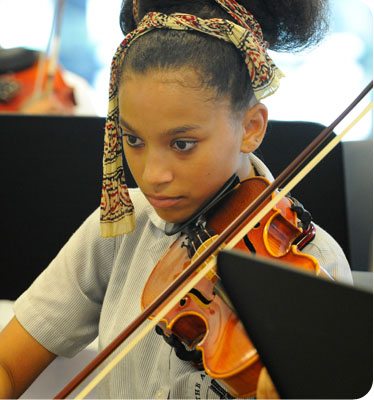 Our focus is on developing students' critical thinking skills and the ability to analyse issues. We also emphasise multicultural understanding and awareness. One of the ways in which we help our students develop skills for ethical leadership is through the Aga Khan Curricular Strands. These are cross-disciplinary areas of study that have been developed for the network of Aga Khan Academies.
Our focus is on developing students' critical thinking skills and the ability to analyse issues. We also emphasise multicultural understanding and awareness. One of the ways in which we help our students develop skills for ethical leadership is through the Aga Khan Curricular Strands. These are cross-disciplinary areas of study that have been developed for the network of Aga Khan Academies.
Overall educational programme
Our curriculum is complemented by co-curricular, athletic and community service initiatives. The overall educational programme is designed to educate well-rounded, civic-minded individuals. It enhances students’ academic excellence, leadership skills, sense of civic responsibility, understanding of global issues, and analytical and study skills. The programme also reinforces an understanding of local languages, history, cultures and environment.
When they graduate from the Academy, students are expected to be computer literate and have a thorough understanding of the diverse academic disciplines covered in the IB curriculum. They should have mastered at least two languages, including English. Through the planned international exchange programme, our students will be able to enhance their foreign language learning and appreciation of other cultures.
Our graduates are thus well prepared for the rigours of higher education and to pursue opportunities in an increasingly interdependent world.
For further information on the IB programmes offered at the Aga Khan Academy Mombasa please visit the following pages:
- Primary Years Programme (years 1–5)
- Middle Years Programme (years 6–10)
- Diploma Programme (years 11–12)
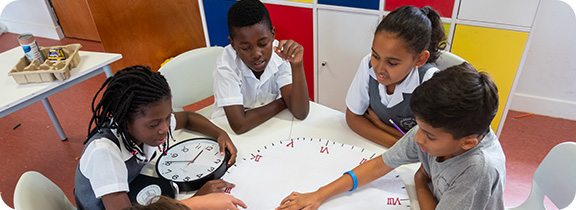
Academic Programme
The Aga Khan Academy Maputo is currently open for Nursery, Junior and Senior School students. We offer an education of an internationally recognised standard of excellence to prepare students to become intellectually curious, global-minded citizens of the world.The Academy programme develops students who are committed to positive change and are able to understand and analyse complex issues of local, national and global significance.
Our curriculum is built on the framework of the International Baccalaureate (IB). The IB is a thorough, multidisciplinary curriculum that fosters:
- intellectual curiosity
- creativity
- leadership development
- social consciousness
- a pluralistic sensibility.
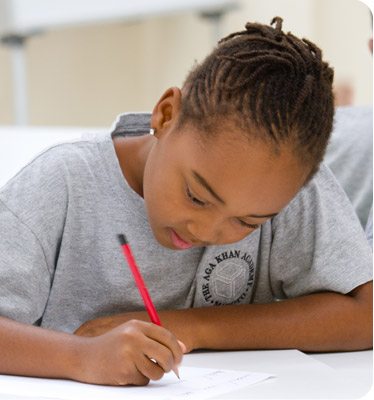
The IB is also known for preparing students for admission to the best universities in their own countries and abroad.
Our focus is on developing students' critical thinking skills and the ability to analyse issues. We also emphasise multicultural understanding and awareness. One of the ways in which we help our students develop skills for ethical leadership is through the Aga Khan Curricular Strands. These are cross-disciplinary areas of study that have been developed for the network of Aga Khan Academies.
Overall educational programme
Our curriculum is complemented by co-curricular, athletic and community service initiatives. The overall educational programme is designed to educate well-rounded, civic-minded individuals. It enhances students’ academic excellence, leadership skills, sense of civic responsibility, understanding of global issues, and analytical and study skills. The programme also reinforces an understanding of local languages, history, cultures and environment.
After completing the full Academy programme, students will be expected to be computer literate and have a thorough understanding of the diverse academic disciplines covered in the IB curriculum. They should have mastered at least two languages, including English. Through the planned international exchange programme, our students will be able to enhance their foreign language learning and appreciation of other cultures.
Our graduates thus will be well prepared for the rigours of higher education and to pursue opportunities in an increasingly interdependent world.
For further information on the programme currently being offered at the Aga Khan Academy Maputo, please visit the Primary Years Programme and Middle Years Programme pages.
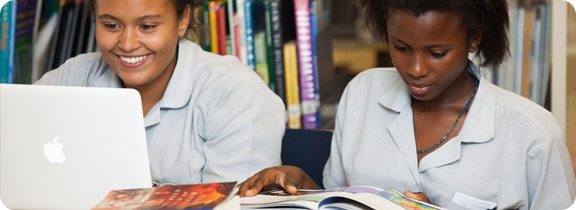
Academic Programme
The Aga Khan Academy, Dar-es-Salaam will initially be opening for Nursery and Junior school students. We offer an education of an internationally recognised standard of excellence to prepare students to become intellectually curious, global-minded citizens of the world.The Academy programme develops students who are committed to positive change and are able to understand and analyse complex issues of local, national and global significance.
Our curriculum is built on the framework of the International Baccalaureate (IB). The IB is a thorough, multidisciplinary curriculum that fosters:
- intellectual curiosity
- creativity
- leadership development
- social consciousness
- a pluralistic sensibility.
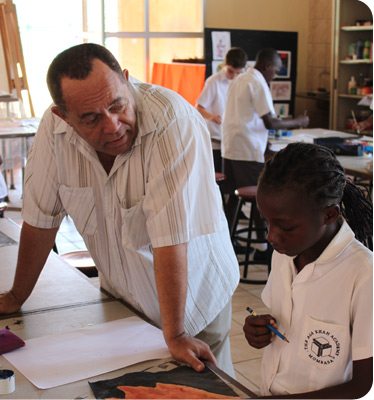 The IB is also known for preparing students for admission to the best universities in their own countries and abroad.
The IB is also known for preparing students for admission to the best universities in their own countries and abroad.
Our focus is on developing students' critical thinking skills and the ability to analyse issues. We also emphasise multicultural understanding and awareness. One of the ways in which we help our students develop skills for ethical leadership is through the Aga Khan Academy Curricular Strands. These are cross-disciplinary areas of study that have been developed for the network of Aga Khan Academies.
Overall Educational Programme
Our curriculum is complemented by co-curricular, athletic and community service initiatives. The overall educational programme is designed to educate well-rounded, civic-minded individuals. It enhances students’ academic excellence, leadership skills, sense of civic responsibility, understanding of global issues, and analytical and study skills. The programme also reinforces an understanding of local languages, history, cultures and environment.
After completing the full Academy programme, students will be expected to be computer literate and have a thorough understanding of the diverse academic disciplines covered in the IB curriculum. They should have mastered at least two languages, including English. Through the planned international exchange programme, our students will be able to enhance their foreign language learning and appreciation of other cultures.
Our graduates thus will be well prepared for the rigours of higher education and to pursue opportunities in an increasingly interdependent world.
For further information on the programme currently being offered at the Aga Khan Academy, Dar-es-Salaam, please visit the Primary Years Programme page.
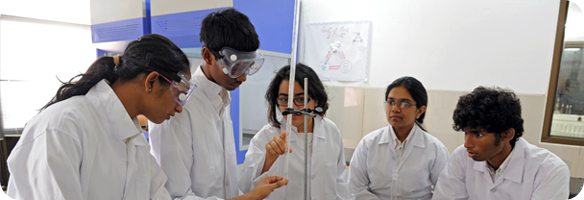
Academic Programme
The Aga Khan Academy Dhaka offers an education of an internationally recognised standard of excellence to prepare students to become intellectually curious, globally-minded citizens of the world.
The Academy programme develops students who are committed to positive change and are able to understand and analyse complex issues of local, national and global significance.
Our curriculum is rigorous and multidisciplinary, fostering:
- intellectual curiosity
- creativity
- leadership development
- social consciousness
- a pluralistic sensibility.
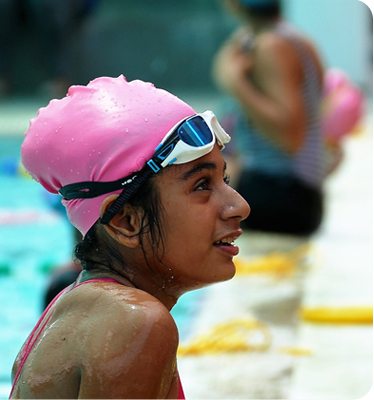 We prepare students for admission to the best universities in their own countries and abroad.
We prepare students for admission to the best universities in their own countries and abroad.
Our focus is on developing students' critical thinking skills and the ability to analyse issues. We also emphasise multicultural understanding and awareness. One of the ways in which we help our students develop skills for ethical leadership is through the Aga Khan Curricular Strands. These are cross-disciplinary areas of study that have been developed for the network of Aga Khan Academies.
Overall educational programme
Our curriculum is complemented by enrichment, athletic and community service initiatives. The overall educational programme is designed to educate well-rounded, civic-minded individuals. It enhances students’ academic excellence, leadership skills, sense of civic responsibility, understanding of global issues, and analytical and study skills. The programme also reinforces an understanding of local languages, history, cultures and environment.
When they graduate from the Academy, students are expected to be computer literate and have a thorough understanding of a diverse range of academic disciplines. They should have mastered at least two languages, including English. Through the planned international exchange programme, our students will be able to enhance their foreign language learning and appreciation of other cultures.
Our graduates are thus well prepared for the rigours of higher education and to pursue opportunities in an increasingly interdependent world.
For further information on the programmes offered at the Aga Khan Academy Dhaka, please visit the following pages:
- Primary Years (Grades 1–5)
- Middle Years (Grades 6–10)
- Diploma Programme (Grades 11–12).
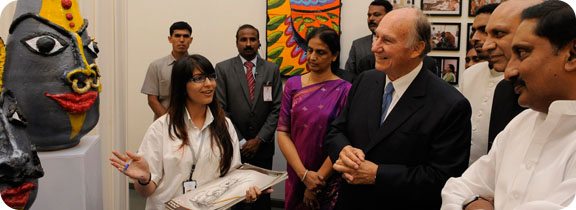
Vision
The outlook and educational perspectives of the Aga Khan Academies are based on the vision of His Highness the Aga Khan. His vision looks to education of the highest quality that can prepare young people to lead and enact positive change in the world they inhabit.
The text below, drawn from the Foreword to Excellence in Education (Aga Khan Academies, 2003), outlines the vision of His Highness for the Aga Khan Academies.
A time of change
"We live in a time of rapid change — change that is often unpredictable and not always positive. My experience with development, as an observer and a practitioner, has led me to the conclusion that the best way to manage change, whether positive or negative, is to prepare for it and that there is no greater form of preparation for change than investments in education. These investments must focus, of course, on teachers of the highest quality — teachers who are creative and committed to their own life-long learning and self-improvement. It also means investments in facilities that provide an environment conducive to the less tangible but equally important elements of an education — self-esteem, leadership, tolerance, ethical judgment and moral reasoning."
What does it mean to be educated?
“However, as educators and parents have begun to make these investments, they are revisiting the age-old question: What does it mean to be an educated person? Many have come to realise that education must prepare students not only for the job market, but also for life.
From Zanzibar's madrassas to Britain's public schools, from American university preparatory academies to government schools in Pakistan, there is a realisation that education must equip students with more than a narrowly focused curriculum based on reading, writing and mathematics. It must expose students to a broad and meaningful study of the humanities, including science, music and art. The teaching of history and world civilisations must be more broadly representative of the world's entire heritage than it has in the past. This is especially true in regard to Islamic civilisations, which have been misrepresented or ignored despite their vital contributions in a wide range of spheres, from science to architecture.
Education must include mastery of more than one language and an ability to communicate effectively in those languages. In the face of the most rapid advances in technology in history, education also must teach students how to master information technologies. These skills now form a critical part of the learning process, as well as essential qualifications for application in the workplace, but even these elements are not enough."
Preparing children for life
“An education must equip students with the tools that enable them to adapt and thrive, in a world characterised by change. In such an environment, technical proficiency is not enough. Education that prepares children for life must go beyond fundamental skills to stimulate creativity, intellectual curiosity and honest inquiry. Advancement and development, both personal and societal, are dependant on these elements. Innovation and progress arise from the ability to approach a challenge in a new way and offer a solution."
A pluralistic outlook
“Education must also make the case for a pluralistic tradition in which other views, ethnicities, religions and perspectives are valued not only because that is just and good, but also because pluralism is the climate best suited for creativity, curiosity and inquiry to thrive. It must also stimulate students to consider a variety of perspectives on some of the fundamental questions posed by the human condition: 'What is truth?' 'What is reality?' and 'What are my duties to my fellow man, to my country and to God?' At the same time, education must reinforce the foundations of identity in such a way as to reinvigorate and strengthen them so that they can withstand the shock of change."
The most important measure of an education
“What students know is therefore no longer the most important measure of an education. The true test is the ability of students and graduates to engage with what they do not know and to work out a solution. They must also be able to reach conclusions that constitute the basis for informed judgements. The ability to make judgements that are grounded in solid information and employ careful analysis, should be one of the most important goals for any educational endeavour. As students develop this capability, they can begin to grapple with the most important and difficult step: to learn to place such judgements in an ethical framework.
“For all these reasons, there is no better investment that individuals, parents and the nation can make than an investment in education of the highest possible quality. Such investments are reflected and endure, in the formation of the kind of social conscience that our world so desperately needs."
His Highness the Aga Khan
Access the biography of His Highness the Aga Khan on the Aga Khan Development Network website.
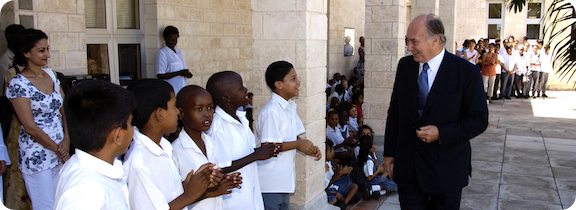
Vision
The outlook and educational perspectives of the Aga Khan Academies are based on the vision of His Highness the Aga Khan. His vision looks to education of the highest quality that can prepare young people to lead and enact positive change in the world they inhabit.
The text below outlines His Highness' vision for the Aga Khan Academies.
A time of change
"We live in a time of rapid change — change that is often unpredictable and not always positive. My experience with development, as an observer and a practitioner, has led me to the conclusion that the best way to manage change, whether positive or negative, is to prepare for it and that there is no greater form of preparation for change than investments in education. These investments must focus, of course, on teachers of the highest quality — teachers who are creative and committed to their own life-long learning and self-improvement. It also means investments in facilities that provide an environment conducive to the less tangible but equally important elements of an education — self-esteem, leadership, tolerance, ethical judgment and moral reasoning."
What does it mean to be educated?
“However, as educators and parents have begun to make these investments, they are revisiting the age-old question: What does it mean to be an educated person? Many have come to realise that education must prepare students not only for the job market, but also for life.
From Zanzibar's madrassas to Britain's public schools, from American university preparatory academies to government schools in Pakistan, there is a realisation that education must equip students with more than a narrowly focused curriculum based on reading, writing and mathematics. It must expose students to a broad and meaningful study of the humanities, including science, music and art. The teaching of history and world civilisations must be more broadly representative of the world's entire heritage than it has in the past. This is especially true in regard to Islamic civilisations, which have been misrepresented or ignored despite their vital contributions in a wide range of spheres, from science to architecture.
Education must include mastery of more than one language and an ability to communicate effectively in those languages. In the face of the most rapid advances in technology in history, education also must teach students how to master information technologies. These skills now form a critical part of the learning process, as well as essential qualifications for application in the workplace, but even these elements are not enough."
Preparing children for life
“An education must equip students with the tools that enable them to adapt and thrive, in a world characterised by change. In such an environment, technical proficiency is not enough. Education that prepares children for life must go beyond fundamental skills to stimulate creativity, intellectual curiosity and honest inquiry. Advancement and development, both personal and societal, are dependant on these elements. Innovation and progress arise from the ability to approach a challenge in a new way and offer a solution."
A pluralistic outlook
“Education must also make the case for a pluralistic tradition in which other views, ethnicities, religions and perspectives are valued not only because that is just and good, but also because pluralism is the climate best suited for creativity, curiosity and inquiry to thrive. It must also stimulate students to consider a variety of perspectives on some of the fundamental questions posed by the human condition: 'What is truth?' 'What is reality?' and 'What are my duties to my fellow man, to my country and to God?' At the same time, education must reinforce the foundations of identity in such a way as to reinvigorate and strengthen them so that they can withstand the shock of change."
The most important measure of an education
“What students know is therefore no longer the most important measure of an education. The true test is the ability of students and graduates to engage with what they do not know and to work out a solution. They must also be able to reach conclusions that constitute the basis for informed judgements. The ability to make judgements that are grounded in solid information and employ careful analysis, should be one of the most important goals for any educational endeavour. As students develop this capability, they can begin to grapple with the most important and difficult step: to learn to place such judgements in an ethical framework.
“For all these reasons, there is no better investment that individuals, parents and the nation can make than an investment in education of the highest possible quality. Such investments are reflected and endure, in the formation of the kind of social conscience that our world so desperately needs."
His Highness the Aga Khan
Access the biography of His Highness the Aga Khan on the Aga Khan Development Network website.
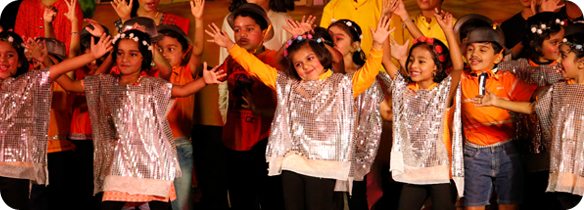
Primary Years
Following in the footsteps of its sister schools in Mombasa, Hyderabad and Maputo, the Aga Khan Academy Dhaka is pursuing authorisation as an IB World School.* These are schools that share a common philosophy — a commitment to high quality, challenging, international education that the Academy believes is important for our students.
Foundations for lifelong learning
Our Primary Years curriculum for students in Grades 1–5 (aged 6–11) focuses on the development of the whole child. It is geared towards creating independent, confident and respectful learners.
Our classroom curriculum addresses the children's social, physical, cultural and ethical development while giving them a strong foundation in all the major areas of knowledge.
The curriculum consists of five essential elements:
- concepts
- knowledge
- skills
- attitude
- action.
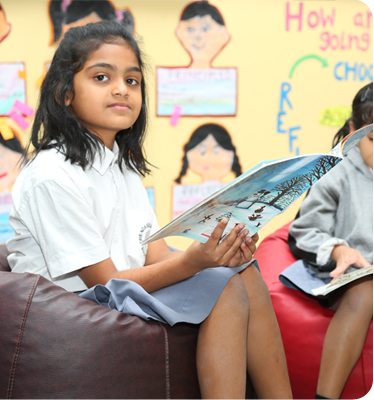 The core subjects we cover include English language, Bangla, mathematics, social studies, science and technology. Our programme also includes physical education, music and art. The use of Informational technology (IT) is integrated throughout the curriculum.
The core subjects we cover include English language, Bangla, mathematics, social studies, science and technology. Our programme also includes physical education, music and art. The use of Informational technology (IT) is integrated throughout the curriculum.
Students and teachers explore questions in all subject areas using an interactive, student-centred approach. This triggers students' curiosity, encouraging them to make connections with real-world issues. Students become active, autonomous learners who can take action as a result of their learning.
Our curriculum develops well-rounded students who are well versed in all areas of knowledge. They learn to be intellectually curious, principled, caring, open-minded, well balanced and reflective learners.
Please visit the Admission Requirements page to find out more about applying to Grades 1-5 at the Academy.
*Only schools authorised by the IB Organization can offer any of its four academic programmes: the Primary Years Programme (PYP), the Middle Years Programme (MYP), the Diploma Programme, or the Career-related Programme (CP). Candidate status gives no guarantee that authorisation will be granted. For further information about the IB and its programmes, visit http://www.ibo.org.
Onwards and Upwards
Congratulations to the Class of 2022! We are so proud of you and cannot wait to see what you do next. As we welcome our new graduating class to our alumni community, we asked four distinct graduates from the Aga Khan Academies in Mombasa and Hyderabad about their journeys and aspirations.
Imra Dawoodani, AKA Hyderabad
Plans to join the University of California, Berkeley for a BSc in electrical engineering and computer science.
What drives you? What is your superpower?
The impact of experiences. Experiences have moulded the most intricate details of the world as I see it. Whether new, old, unexpected, or a planned experience, each circumstance prompts the creation of a new approach within me, defining my ability to adapt to a multitude of situations. Sometimes it outlines my path, in other cases it intrigues me to look for one.
How did the Academy impact you?
It's been a journey. Exposing me to every emotion one could feel, pushing me forward every second because life never stops, and opening routes to a variety of opportunities, the Academy has thoroughly done its part in making me realise that I'm the only one who can take a call for myself.
You’re a new addition to the crayon box; what color would you be and why?
Grey may not seem like the ideal choice, but it depicts my conflicted self. I'm the one trying to figure out light and darkness, ebbs and flows, the balance between emotions and practicality. A simpler derivative to this conclusion would be my utterly annoying indecisiveness. I'd be the one to mix sushi and dal however horrendous it sounds because I just cannot choose what I want to eat today.
Jacintha Thota, AKA Hyderabad
Plans to join the London School of Economics and Political Science for a BSc in politics and economics
What drives you?
Two things that have driven me for a very long time are fascination and long-term goals. I am someone who just loves the idea of learning new things. Whatever I put my mind to is always driven by a sense of love, a sense of wonder, whether that's my academics or my extra curriculars. That fascination keeps me going. When it comes to long-term goals, I do know I want to work in the field of economics when it comes to equity or sustainability and that has shaped my interests and path.
How did the Academy impact you?
The most profound impact has been that it has shown me the world is so much bigger than the bubble that you grew up in. It brought together people from different cultures and socioeconomic backgrounds. It has shaped my goals to be community oriented. And it has shown me that being a good person is having the right mindset and being tolerant to new ideas and new people.
What challenges did you face and how did you overcome them?
COVID-19 lockdowns and the kind of terror it put around the world when I was doing my DP journey meant it was incredibly hard to stay motivated when people were literally dying around you by the thousands. It left me with a sense of cynicism and feeling really demotivated. But actually, coming back to the academy and being around people again reminded me just how much I valued this community. It definitely helped overcome the sense of dread I had started to feel during those 18 months or so.
Khushi Bajaria, AKA Mombasa
Plans to join the University of Miami to study health science (pre-med
What challenges did you face and how did you overcome them? What was your best mistake?
I faced the challenge of making friends because of the way I felt the need to please my friends continuously. However, as I focused time on my goals, I eventually became part of a diverse group of friend groups. I also first thought it was a mistake that I ignored the warning from my personal project coordinator to not go ahead with my idea as it may impact my grades if I fail in it, however, as I believed in the impact it could make and communicated with the right people, I was able to be successful in it and make a greater impact than expected.
How would you describe success and what do you hope to achieve in the next 5 years?
Success is a never-ending mountain with large rocks of joy and glee that help one stay stable, and numerous smaller rocks that keep pushing one to slip backward in their journey of meeting their expectations. The soil of the mountain is then like family and friends that support and help piece part of this journey together to make success what it is. I hope to have completed my bachelor's degree in health sciences and my first year of medical school. I also hope to have expanded my project (teaching Grade 5 to 7 students in how to create and help an eco-friendly microscope). I hope by then, I shall have taught the developmental process in more than fifteen schools in different countries through a team internationally.
Mishal Lalani, AKA Mombasa
Plans to join Middlebury College to major in microbiology and biochemistry and a minor in geography and sociology
What are your plans after graduation?
Firstly, I plan to sleep, have fun and just wind down all the stress that we have been put through for the past two years. I also look forward to and plan to spend time with my family before I leave for university in August, as well as the friends who live around me. Similarly, I hope to do a short internship at the Aga Khan Hospital in Mombasa just to grasp the healthcare environment as that is what I hope to pursue in the future.
What drives you? What is your superpower?
What has particularly always driven me is the community around me. Seeing the community improve when I help out or different community projects help out makes me want to go the extra mile and do more.
How did the Academy impact you?
The Academy made me an all-rounded individual and made me a global citizen. Being the first cohort to go on the exchange programme, I felt very privileged to be at the Academy and to have access to such amazing opportunities that will indeed be spoken about and recognised for the rest of my life. I made the most special memories at the Academy. Most importantly, the Academy taught me that no matter who I am or where I come from, I can make a change if I want to. This was the biggest lesson for me, and I believe it will take me far in life.
Aleem Mawji (Class of 2012): The most powerful weapon
A Hand Up at the Aga Khan Academy
I was born in Dar es Salaam, Tanzania, where I went through Aga Khan Nursery, Primary and Secondary schools. When I was approaching my last two years of secondary education, I started considering a move away from home to prepare for life in university, and the Aga Khan Academy Mombasa came to mind. I had visited the campus in seventh grade for a soccer tournament, and was left amazed by the beauty of the facility.
To be perfectly frank, my family’s financial circumstances would have made it very difficult to attend the Academy; some form of financial assistance was crucial. I was thrilled when AKA saw past the financial difficulty, recognized my accomplishments and potential to excel, and accepted me with a scholarship. I gratefully accepted the scholarship, knowing I had a responsibility to make full use of this immense opportunity. So at age 16 I set out for Mombasa and started with the International Baccalaureate (IB) program!
Learning a New Mode of Thinking; Meeting a New Community
Every day at AKA was challenging, as anyone that has experience with the IB program can certainly attest! Even mathematics presented a new language; I remember having to read a paper on mathematics with the date of publication and page numbers being the only numbers in the entire document! However, my most valuable academic experience was studying the Theory of Knowledge. This course focused very strongly on making one critically examine what it is that we “know.” To this day it has me questioning a lot of premises I would otherwise accept.
While the academic environment was fairly rigorous, it only enforced the already-strong sense of community one would experience in the residential program. One moment, we were scratching our heads over a physics lab report due that evening, and the next, we were plotting ways to sneak into the AstroTurf to kick the soccer ball around! In my opinion, this type of learning environment truly makes the Academy a unique and fulfilling experience. To this day, I still regard many of my dorm-mates as extended family rather than school colleagues.
Path to British Columbia
At the end of my two-year stay in Mombasa, I was honored to receive the Academy’s Medal of Honor for highest academic standing, and Award of Excellence; an all-round award for academics, sports, extracurricular, leadership, and volunteering. I was also nominated by the Academy for the International Leader of Tomorrow Award from the University of British Columbia (UBC). I received this award in the form of a full scholarship to study the program of my choice at UBC’s campus in Vancouver, Canada. While I left the compound of the Academy with immense joy knowing I had fulfilled some expectations placed on me, I felt an even greater sense of responsibility to myself, my family and the Academy given my opportunity to study in British Columbia.
The program I decided to study was Mechanical Engineering. Coming from a family of engineers certainly played a role in this decision, but I most appreciated the versatility of the degree and how the applications of mechanical engineering design spanned a range of industries. Over the course of my degree, I have worked on projects ranging from micro-controller-based autonomous vehicles, to a drip-irrigation system for optimizing use of a limited water supply. I have also spent eight months in the maintenance engineering department of a large copper mine, and have worked on the design of a device to prevent excessive bleeding from an injured limb.
I attribute my desire to work on this wide range of projects to two things: an unwillingness to be satisfied with the knowledge the I possess at any time, and a desire to have a larger positive impact on as many fronts as I can, when I have the capacity to do so. While these are arguably generic traits, my belief in them has been strongly enforced by the people I met at the Academy, and the Aga Khan Academy Learner’s Profile that the institution so strongly stands for and promotes in its students.
Working Together
During my third-year in university, I found myself at a cross-roads. While I enjoyed the versatility of the engineering degree, a part of me knew that becoming a professional engineer may not have been best-suited to my aspirations.
When I was in London visiting my cousin in the summer of 2015, he introduced me to the world of management consulting. Initially, it brought to mind an image of a team in suits, working in isolation, preparing a PowerPoint deck instructing a company on changes to be made to achieve X. I later discovered how out-of-date this impression is. Management consulting, I have found, is all about solving complicated problems that have a large impact on the clients and the community around them. More often than not, this is achieved while working hand-in-hand with the client companies to implement a proposed solution.
I learned more about this industry during a recent internship with McKinsey & Company. During this time, I got to work with a large coal mine that was seeking to reduce its maintenance costs. What was truly unique about this experience was how we were in the field, working with the tradesmen, foremen and managers, asking ourselves questions like “How do we know when best to replace this $300,000 piece of equipment? What actionable change can we make to our maintenance practice? How can we track the effect of this change?” We would draw on the strengths of each other’s backgrounds and figure out practical solutions together! I really appreciate this idea. I don’t want my work to be just theoretical or conceptual. I want to be on the front line, working with the people in question to make these changes tangible.
Harnessing Potential
One project that grew during my undergraduate study was a company that my brother, Naeem, and I co-founded. The company’s goal (to increase the access to electricity for people in Tanzania) was strongly based on values my family instilled, and that were prevalent at my time at the Academy. First, it applied the idea of giving back when one has the capacity to do so – not because we have to, but because we can. Second, it focused on the notion of sustainability and building capacity; not a one-time handout, but an activity that helps people harness their own potential to thrive.
In some ways, I see parallels in the role that the Aga Khan Academy has played in my story. As I approach the end of my undergraduate studies and begin my transition into a professional career, I reflect on the events that have taken place, and the individuals that have played a role to get me to the position I am in. While I owe an unparalleled amount of credit to my parents and two siblings for instilling the right foundation, I cannot overestimate the role the Academy played in my development. I came into the Academy with a scholarship, viewed as a student with potential, and have since become an individual with a stronger belief in my ability to harness my own potential, and that of people around me. That, I believe, is the most powerful weapon.
This spotlight is republished courtesy of AKF USA.
